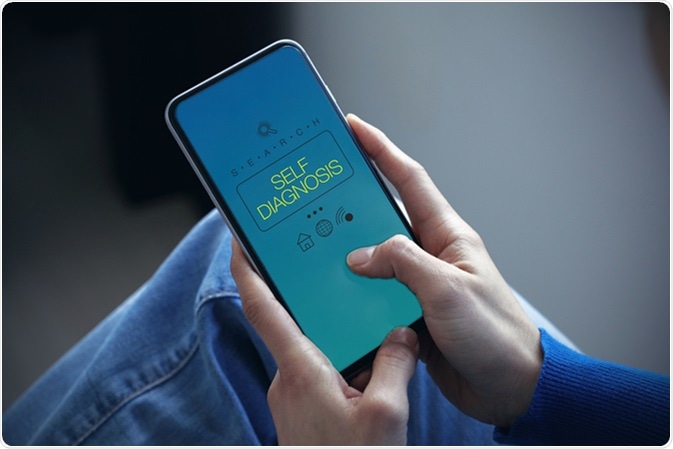.jpg) By Chloe Bennett, B.Sc.Reviewed by HH Patel, M.Pharm.
By Chloe Bennett, B.Sc.Reviewed by HH Patel, M.Pharm.There is now an abundance of health information online for people to access whenever they need. As a result of this, a large number of adults regularly use the internet to diagnose their urgent and non-urgent ailments, with the majority also trusting the information they find to successfully diagnose themselves.
For some, healthcare can be very expensive. Spending on healthcare in most countries has increased considerably, and outpaced the economic growth. Concerns have been raised as to whether current financial models used in the healthcare systems will continue to be sustainable when an aging population increases demands on the services.
Discouraging people from unnecessarily visiting healthcare services may be a solution to ease the demands. Therefore, could self-diagnostic tools be beneficial in reducing demand and patient waiting lists, or will they exacerbate the situation?

Image Credit: Marta Design / Shutterstock
Features of Symptom Checkers
For most symptom checkers, users have to answer a series of questions about their symptoms, or input the details themselves. The user is then presented with a list of possible diagnoses, which are often ranked by likelihood.
Some even feature a triage setting, which notifies the user whether they should seek medical care and how urgently, for example, whether they should visit the emergency department or a practitioner’s clinic. Alerting patients to seek assistance as early as possible may increase survival rates for certain diseases such as cancer.
Issues Regarding the Use of Self-Diagnostic Tools
One issue regarding self-diagnostic tools is the production of false results, whereby the users wrongly diagnose themselves as having a condition that they do not have. This may be caused by users not being able to identify all of their symptoms such as low blood pressure, or they may simply miss critical symptoms or indicators.
A consequence of this is that the patients who actually have a serious condition, may be presented with a diagnosis that they deem not to be significantly detrimental to their health. For example, misdiagnosing a fever or a viral infection for sepsis. In this situation, if the diagnosis produced by the self-assessment tool is used as a substitute to visiting a doctor, it may cause further health consequences for the individual and additional pressures on the healthcare service to provide critical interventions if the patient’s condition worsens as a result of not seeking proper help sooner.
Another implication of self-diagnostic tools is that users may often feel overwhelmed by the number of possible diagnoses presented to them, and unable to pin-point one, they may wait until their symptoms worsen before seeking help. This may result in further complications which require significantly more medical attention than if it would have been diagnosed and treated earlier.
Research has found that self-diagnosis of conditions could cause issues between a patient and their clinician. It was found that clinicians might feel threatened by the information presented by the patient, and in response exert their “expert opinion”. Additionally, if the patient is misinformed, this can be one of the most likely barriers to having a good doctor-patient relationship.
Potential Benefits of Self-Diagnosis
However, the studies also discovered that by patients doing background research and being more knowledgeable about a possible condition, they may enable more mutually beneficial opportunities to occur, if the clinician and the patient work together to collect and analyze the information. Moreover, if the doctor examines the patient further and agrees with one of the diagnoses, it may speed up the overall process, allowing patients to receive the necessary treatments sooner.
This could be extremely beneficial, as it has been self-reported by doctors that a lack of time is a common barrier to maintaining a positive communication channel with their patients.
If self-diagnostic tools were certified by medical professionals from credible sources, and produced consistently correct diagnoses, it could be extremely beneficial in reducing unnecessary visits to healthcare services, and waiting times for an official diagnosis.
In 2017, Google and the National Alliance on Mental Illness (NAMI) worked in collaboration to create a self-assessment tool for users to find out whether they should visit a healthcare practitioner for their depressive symptoms. Tools such as these may ensure that those who really need to seek medical advice, do so.
Self-Diagnostic Tools and the Future of Healthcare
If self-diagnostic tools consistently produce correct diagnoses, it could benefit the healthcare service by prompting patients to visit the correct healthcare service when necessary, and enable quicker diagnosis if the patient presents the results of self-diagnostic tools to their doctor. Arguably, there may still be issues surrounding patients’ ability to correctly identify all of their symptoms, which may cause misdiagnoses and further repercussions on not only the individual, but the healthcare service too.
Further Reading
Last Updated: Jul 18, 2023